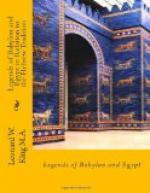(1) The references to “the ground”, or “the earth”, also tend to connect it peculiarly with Enlil. Enlil’s close association with the earth, which is, of course, independently attested, is explicitly referred to in the Babylonian Version (cf. Gilg. Epic. XI, ll. 39-42). Suggested reflections of this idea have long been traced in the Hebrew Versions; cf. Gen. viii. 21 (J), where Yahweh says he will not again curse the ground, and Gen. ix. 13 (P), where Elohim speaks of his covenant “between me and the earth”.
With the sixth line of the column it is clear that the original narrative of the myth is resumed.(1) Ziusudu, the king, prostrates himself before Anu and Enlil, who bestow immortality upon him and cause him to dwell in a land, or mountain, the name of which may perhaps be read as Dilmun. The close parallelism between this portion of the text and the end of the myth in the Gilgamesh Epic will be seen from the following extracts,(2) the magical portions being omitted from the Sumerian Version:
(1) It will also be
noted that with this line the text again
falls naturally into
couplets.
(2) Col. VI, ll.
6-9 and 12 are there compared with Gilg.
Epic, XI, ll. 198-205.
SUMERIAN VERSION SEMITIC VERSION
Then Enlil went up into the ship; Ziusudu, the king, He took me by the hand and led me forth. Before Anu and Enlil bows himself He brought out my wife and down. caused her to bow down at my side; He touched our brows, standing between us and blessing us: Life like (that of) a god he “Formerly was Ut-napishtim of gives to him. mankind, An eternal soul like (that of) a But now let Ut-napishtim be god he creates for him. like the gods, even us! And let Ut-napishtim dwell afar off at the mouth of the rivers!” In a . . . land, the land of(1) Then they took me and afar off, Dilmun(?), they caused him to at the mouth of the rivers, dwell. they caused me to dwell.
(1) Or, “On a mountain, the mountain of”, &c.
The Sumerian Version thus apparently concludes with the familiar ending of the legend which we find in the Gilgamesh Epic and in Berossus, though it here occurs in an abbreviated form and with some variations in detail. In all three versions the prostration of the Deluge hero before the god is followed by the bestowal of immortality upon him, a fate which, according to Berossus, he shared with his wife, his daughter, and the steersman. The Gilgamesh Epic perhaps implies that Ut-napishtim’s wife shared in his immortality, but the Sumerian Version mentions Ziusudu alone. In the Gilgamesh Epic Ut-napishtim is settled by the gods at the mouth of the rivers, that is to say at the head of the Persian Gulf, while according to a possible rendering of the Sumerian Version he




